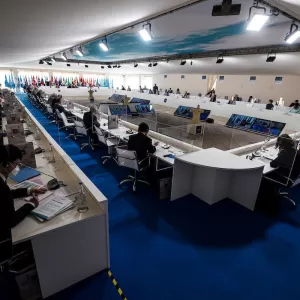G20 Must Catalyze the Transforming of our Food Systems
CGIAR called on the G20 to foster international cooperation that transforms food systems through a comprehensive and inclusive agenda, in a statement to the group’s Foreign Affairs and Development Ministerial Session in Matera, Italy, on June 29. In the meeting, Juan Lucas Restrepo, Global Director, Partnerships and Advocacy, CGIAR, and Director General of the Alliance of Bioversity International and the International Center for Tropical Agriculture (CIAT),

G20 Must Catalyze the Transforming of our Food Systems
CGIAR called on the G20 to foster international cooperation that transforms food systems through a comprehensive and inclusive agenda, in a statement to the group’s Foreign Affairs and Development Ministerial Session in Matera, Italy, on June 29.
In the meeting, Juan Lucas Restrepo, Global Director, Partnerships and Advocacy, CGIAR, and Director General of the Alliance of Bioversity International and the International Center for Tropical Agriculture (CIAT), argued there are two priority areas where G20 leadership is crucial in accelerating global action on food and agriculture that supports the UN Sustainable Development Goals:
- The G20 must champion an increase in investment in research and the development of innovative science-based solutions and technologies that can help us produce more nutritious food, at affordable prices while preserving biodiversity;
- The G20 must actively support ongoing dialogue between researchers and policy makers through mechanisms where the two can meet and commit to informed action that accelerates innovation that reaches all socio-economic groups around the world.
Setting the context for CGIAR’s recommendations, Juan Lucas Restrepo outlined the compelling case for urgent action:
- Agriculture and food systems are degrading our environment, eroding our biodiversity and fuelling the climate crisis;
- Under the strain of a global pandemic, decades of progress on hunger and nutrition are unravelling at unprecedented pace;
- The global post-pandemic recovery must start with the transformation of our food systems to be more sustainable and resilient in the face of climate change;
- Positively transforming food systems would also foster peace and stability in fragile regions around the world.
He emphasized how 2021 offers unique opportunities to drive global commitment and solidarity to accelerate action at both the United Nations Food Systems Summit, which takes place in New York this September, and the UN COP26 climate summit in Glasgow this November. Both offer a chance to put climate change solutions on the table that embrace our natural habitat and support more sustainable agricultural sectors – a key foundation for broad and inclusive development.
In his concluding remarks on behalf of CGIAR at the Matera G20 meeting, Juan Lucas Restrepo highlighted the abundance of technologies, innovations and solutions that have emerged from fifty years of CGIAR’s global partnerships, including those developed by 2021 World Food Prize laureate Dr. Shakuntala Thilsted of WorldFish, a CGIAR Research Center.
He acknowledged and thanked the Government of Italy for the organization of the Matera ministerial session and its declaration, which CGIAR strongly supports and stands ready to collaborate with all partners to implement.
Header photo by G20.

